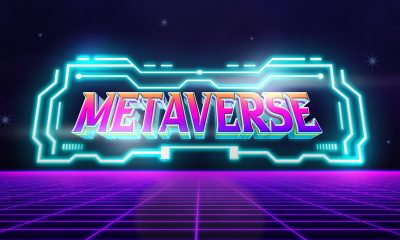Business
High-Growth Investment Opportunities in the Metaverse: Here’s Where You’ll Find Them
Investment in the metaverse is a hot topic right now. But if you’re looking for the biggest opportunities, the obvious investments like Meta might not be for you. Here we look at two alternative investments: metaverse tokens, and startups filling gaps in big tech’s current version of the metaverse. We also throw in a few tips along the way to help you hunt down more opportunities of your own.

If there’s ever been a time to invest in the metaverse, it’s now. The only problem is that the metaverse has kinda gone from 0 to 60 so fast that many of us haven’t even regained our bearings. The fact that we’re still seeing a new volley of articles describing what the metaverse is on a daily basis is a testament to this.
So if we still aren’t quite sure what the metaverse is, how exactly do we invest in it? Sure, there’s that one company that audaciously renamed itself after the metaverse. And then there’s that Roundhill Ball Metaverse ETF (NYSE: META) which got dibs on the META ticker, thus winning the right to pull a “ner ner ner, we were here first” and force Meta to adopt a less obvious ticker (NASDAQ: FB through to Nov. 30, MVRS from Dec. 1).
For less conservative investors, however, both of these plays might be too lackluster. There’s much bigger potential for growth here than in Facebook/Meta (whose growth will only be proportional to the incremental advertising revenue it can generate via the metaverse) or a relatively safe index fund (Roundhill’s ETF aims to track the Ball Metaverse Index).
So what if you want to look for plays with bigger upside potential? Where do you look?
Here are a couple of suggestions.
Metaverse Tokens
Let’s start off with the most speculative bet here: metaverse tokens.
Inherently tied to cryptocurrencies (tokens are generally an asset based on smart contracts on an existing blockchain), metaverse tokens are a special class of assets generally reserved for use in a specific corner of the coming metaverse.
One of the most prominent of these, Decentraland (MANA), is based on the Ethereum blockchain and is made for use within the ecosystem sharing its name. Yes, that Decentraland—the virtual world you may have already heard about, where real estate prices (well, NFTs representing a plot of virtual land) are hitting multi-million dollar valuations.
But MANA is far from the only token made specifically for the metaverse. Creators of other virtual worlds have been creating tokens left, right, and center, with most of them made for the sole purpose of trade in virtual goods in a particular world.
And while we don’t have the space here to even touch the surface of what’s available here, there are a few that stand out as worth keeping a close eye on. MANA is, of course one, but there is also Axie Infinity (AXS), The SandBox (SAND), Enjin Coin (ENJ), Star Atlas (NYSE: ATCO) (ATLAS), Metaverse Index (MVI), and Aavegotchi (GHST). A good summary of these tokens can be found here.
The only other note to make now is that metaverse tokens are still a highly-speculative asset class, even more so than the base basket of cryptocurrencies like Ethereum (ETH) and Bitcoin (BTC) we think of when talking about crypto. With token values tightly coupled to the popularity of the particular platforms to which they are tied, they find themselves at heightened risk of extreme fluctuations in value according to nothing more than fads.
Startups Filling Gaps Left by Big Tech
The next—and, for most people, the more sensible—place to look for alternative metaverse investments is towards younger metaverse companies. In particular, look out for companies building tools that fill gaps in the current metaverse landscape.
Finding these holes isn’t too hard, either.
At the moment, we see a lot of tools being built by platforms for use exclusively within that platform. A lot of Snap’s (NYSE: SNAP) AR ecosystem is a prime example here—powerful tools that are increasingly user-friendly, but eventually leave businesses and creators tied to the platform.
This is leaving businesses wanting to build tools of their own, however—for example, an augmented reality catalog—with limited options. At best, they choose a limited number of platforms—let’s say Snap and Shopify Inc. (NYSE: SHOP)—and create siloed AR experiences for each one.
A perfect example of a young metaverse company to watch in this space is XRApplied Technologies, Inc. (OTCQB: XRAPF | CSE: XRA). What sets XRApplied apart is its intense focus on building tools that cater to SMEs, and doing it in a cost-effective, platform-agnostic way.
XRApplied solves this through its platform-agnostic SDKs and development blueprint. Using technology that it’s been building over the last year or two, it can now take a basic set of business assets and leverage them across multiple platforms with minimal work. This not only helps businesses get their latest AR metaverse creations in front of consumers as fast as possible, but it also dramatically cuts the costs involved in doing so.
Of course, XRApplied isn’t the only company filling gaps in big tech’s current vision of the metaverse. However, the options in the startup space are, obviously, limited as there just aren’t that many that have made it to public markets yet. But, for investors keen to do the hunting for more of these opportunities, seeking out utility tokens (a little like metaverse tokens, but tokens for a company’s goods and services instead of virtual goods) or crowdfunding campaigns are equally viable options.
__
(Featured image by Harsch Shivam via Pexels)
DISCLAIMER: This article was written by a third-party contributor and does not reflect the opinion of Born2Invest, its management, staff, or its associates. Please review our disclaimer for more information.
This article may include forward-looking statements. These forward-looking statements generally are identified by the words “believe,” “project,” “estimate,” “become,” “plan,” “will,” and similar expressions. These forward-looking statements involve known and unknown risks as well as uncertainties, including those discussed in the following cautionary statements and elsewhere in this article and on this site. Although the Company may believe that its expectations are based on reasonable assumptions, the actual results that the Company may achieve may differ materially from any forward-looking statements, which reflect the opinions of the management of the Company only as of the date hereof. Additionally, please make sure to read these important disclosures.

-

 Crypto2 weeks ago
Crypto2 weeks agoBitcoin Rebounds Above $70K as Crypto Markets Show Fragile Signs of Recovery
-

 Crypto2 days ago
Crypto2 days agoIntesa Sanpaolo Signals Institutional Shift With Major Bitcoin ETF Investments
-

 Biotech1 week ago
Biotech1 week agoEurope Launches Personalized Cancer Medicine Initiative
-

 Crypto5 days ago
Crypto5 days agoBitcoin Wavers Below $70K as Crypto Market Struggles for Momentum





















